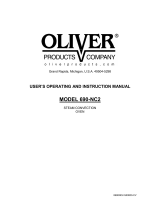
17
Operation
MenuSelect™ Control
OPERATION
Oven Startup
1. Be sure the GAS SHUTOFF SWITCH (17) and CIR-
CUIT BREAKER (16) are in the on position. The dis-
play ashes OFF PRESS POWER KEY TO START.
NOTE: If the real time clock and auto wake up func-
tions are enabled the display reads PRESS
POWER KEY TO START AUTO START.
2. Press the POWER KEY (15). The display reads PRE-
HEAT and the oven heats to the last manual set tem-
perature. The display ashes READY / IDLE and the
alarm beeps 5 times when the oven is at temperature
and ready to bake.
Manual Baking Mode
1. Turn the DIAL (5) until the display reads MANUAL.
2. Press the TIME KEY (7). Rotate the dial, or use the
alpha/numeric keypad to enter the desired bake time.
Press the center of the dial to set the bake time.
3. Press the TEMP KEY (6). Rotate the dial, or use the
alpha/numeric keypad to enter the desired bake tem-
perature. Press the center of the dial to set the bake
temperature. The oven preheats to the new tempera-
ture.
4. To inject steam at the beginning of the bake cycle,
press the STEAM KEY (8). Rotate the dial, or use the
alpha/numeric keypad to enter up to two minutes of
steam. Press the center of the dial to set the steam
time.
NOTE: The convection fan will not run during a
steam cycle. It is not necessary to set a fan
delay while steaming.
5. For additional fan delay time, press the FAN DELAY
KEY (9). Rotate the dial, or use the alpha/numeric
keypad to enter up to 1 hour and 39 minutes. Press
the center of the dial to set the fan delay.
6. When the display ashes READY / IDLE, open the
doors. The rack rotates to the load/unload position.
Load the product.
7. Press the START/STOP KEY (1) to begin the bake
cycle. The timer counts down and the display alter-
nates between the set and actual temperature and
the name of the product.
Programmed Baking Mode
1. Turn the DIAL (5) until the name of the product is
highlighted. Press the center of the dial to select. The
oven preheats to the programmed temperature. The
display ashes READY / IDLE and the alarm beeps
5 times when the oven is at temperature and ready
to bake.
2. Open the doors. The rack rotates to the load/unload
position. Load the product.
3. Press the START/STOP KEY (1) to begin the bake
cycle. The timer counts down and the display alter-
nates between the set and actual temperature and
the name of the product.
During Any Bake Cycle
1. To inject up to two minutes of steam during the bake
cycle, press the QUICK STEAM KEY (11).
2. To vent moisture from the oven cavity, press the
VENT KEY (10). This manually opens the vent until
the key is pressed again to close it.
3. To pause a bake cycle at any point, press the START/
STOP KEY (1). The LED on the start/stop key ash-
es. The bake cycle will pause until the key is pressed
again.
4. To cancel the bake cycle, press and hold the START/
STOP KEY (1).
At the End of Any Bake Cycle
1. An alarm sounds, the display reads BAKE DONE.
2. If more bake time is desired, press the BAKE MORE
KEY (3). This will add an additional one minute of
time for each press of the key.
3. When you are satised with the bake, press the
START/STOP KEY (1) to silence the alarm. Open the
door to remove the product. The rack will rotate to the
load/unload position.
Oven Shutdown
1. Press the COOL DOWN KEY (2). The display reads
AUTO COOL DOWN ACTUAL TEMP. To speed up
the cool down process, open the doors and press the
VENT KEY (10) to open the vent.
2. When the oven has cooled down, the display reads
OFF PRESS POWER KEY TO START.
NOTE: The lights shut o and the vent closes auto-
matically at the end of the cool down cycle.




















